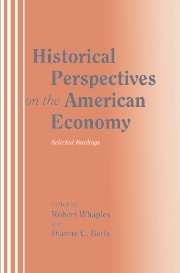Book contents
- Frontmatter
- Contents
- Acknowledgments
- Introduction to students
- Introduction to instructors
- Contributors
- I Introduction
- II Colonial and early national economy
- 2 “An economic interpretation of the American Revolution”
- 3 “The market and Massachusetts farmers, 1750–1855”
- III Slavery and servitude
- IV The South since the Civil War
- V The rise of American industrial might
- VI Populism
- VII Women in the economy
- VIII The Great Depression
- Appendix: Basics of regression
- Glossary
- Name index
- Subject index
3 - “The market and Massachusetts farmers, 1750–1855”
Published online by Cambridge University Press: 05 June 2012
- Frontmatter
- Contents
- Acknowledgments
- Introduction to students
- Introduction to instructors
- Contributors
- I Introduction
- II Colonial and early national economy
- 2 “An economic interpretation of the American Revolution”
- 3 “The market and Massachusetts farmers, 1750–1855”
- III Slavery and servitude
- IV The South since the Civil War
- V The rise of American industrial might
- VI Populism
- VII Women in the economy
- VIII The Great Depression
- Appendix: Basics of regression
- Glossary
- Name index
- Subject index
Summary
This paper attempts to make a contribution, both in method and in substance, to the debate about the timing and extent of market orientation in pre-industrial New England agriculture. The method consists in testing five quantifiable hypotheses, with data from manuscript account books and daybooks. The results, in repeated trials, confirm the influence of the market on the rural economy of Massachusetts from very early on.
Circumscribed as this subject is, its historiography in this century has followed a dialectic closely paralleling the dialectic of American history-writing generally. A preliminary survey of the debate will set the argument of this paper in its proper setting.
The debate began with Percy Bidwell. In all his work he described eighteenth- and early nineteenth-century farmers in New England as trapped by poor husbandry in chronically low-yield, subsistence agriculture, isolated by the lack of markets from the growth generated in the commercial sectors of the economy.
The point here is that Bidwell's perspective was fully consistent with the Progressive historiography of his own time. Substantively, he confirmed that conflicts of interest existed, in this case between farmers involved in the market and those locked outside it, between farmers with land who could remain and those without land who would have to move on, between farmers on the one hand and merchants and artisans on the other. In addition, the methodological consequences of putting about three quarters of New England's population beyond the reach of the market were congenial to the Progressives who wanted to limit the dominion of abstract theory over the rough texture of real life.
- Type
- Chapter
- Information
- Historical Perspectives on the American EconomySelected Readings, pp. 71 - 106Publisher: Cambridge University PressPrint publication year: 1995
- 1
- Cited by



